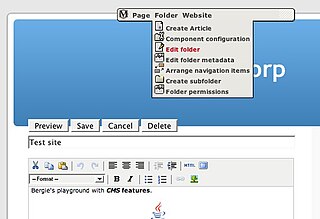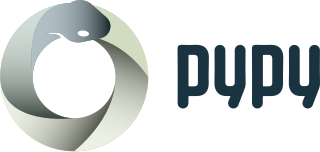
Plone is a free and open source content management system (CMS) built on top of the Zope application server. Plone is positioned as an enterprise CMS and is commonly used for intranets and as part of the web presence of large organizations. High-profile public sector users include the U.S. Federal Bureau of Investigation, Brazilian Government, United Nations, City of Bern (Switzerland), New South Wales Government (Australia), and European Environment Agency. Plone's proponents cite its security track record and its accessibility as reasons to choose Plone.

Midgard is an open source persistent storage framework. It provides an object-oriented and replicated environment for building data-intensive applications.
The Python Software Foundation (PSF) is an American nonprofit organization devoted to the Python programming language, launched on March 6, 2001. The mission of the foundation is to foster development of the Python community and is responsible for various processes within the Python community, including developing the core Python distribution, managing intellectual rights, developer conferences including the Python Conference (PyCon), and raising funds.
The Web Server Gateway Interface is a simple calling convention for web servers to forward requests to web applications or frameworks written in the Python programming language. The current version of WSGI, version 1.0.1, is specified in Python Enhancement Proposal (PEP) 3333.

DNN Platform is a web content management system and web application framework based on the .NET Framework. It is open source and part of the .Net Foundation.

Django is a free and open-source, Python-based web framework that runs on a web server. It follows the model–template–views (MTV) architectural pattern. It is maintained by the Django Software Foundation (DSF), an independent organization established in the US as a 501(c)(3) non-profit.
Multi-licensing is the practice of distributing software under two or more different sets of terms and conditions. This may mean multiple different software licenses or sets of licenses. Prefixes may be used to indicate the number of licenses used, e.g. dual-licensed for software licensed under two different licenses.
A permissive software license, sometimes also called BSD-like or BSD-style license, is a free-software license which instead of copyleft protections, carries only minimal restrictions on how the software can be used, modified, and redistributed, usually including a warranty disclaimer. Examples include the GNU All-permissive License, MIT License, BSD licenses, Apple Public Source License and Apache license. As of 2016, the most popular free-software license is the permissive MIT license.

PyPy is an implementation of the Python programming language. PyPy often runs faster than the standard implementation CPython because PyPy uses a just-in-time compiler. Most Python code runs well on PyPy except for code that depends on CPython extensions, which either does not work or incurs some overhead when run in PyPy.

Jinja is a web template engine for the Python programming language. It was created by Armin Ronacher and is licensed under a BSD License. Jinja is similar to the Django template engine but provides Python-like expressions while ensuring that the templates are evaluated in a sandbox. It is a text-based template language and thus can be used to generate any markup as well as source code.

Allison Randal is a software developer and author. She was the chief architect of the Parrot virtual machine, a member of the board of directors for The Perl Foundation, a director of the Python Software Foundation from 2010 to 2012, and the chairman of the Parrot Foundation. She is also the lead developer of Punie, the port of Perl 1 to Parrot. She is co-author of Perl 6 and Parrot Essentials and the Synopses of Perl 6. She was employed by O'Reilly Media. From August 2010 till February 2012, Randal was the Technical Architect of Ubuntu at Canonical.
License proliferation is the phenomenon of an abundance of already existing and the continued creation of new software licenses for software and software packages in the FOSS ecosystem. License proliferation affects the whole FOSS ecosystem negatively by the burden of increasingly complex license selection, license interaction, and license compatibility considerations.

The GNU Affero General Public License is a free, copyleft license published by the Free Software Foundation in November 2007, and based on the GNU GPL version 3 and the Affero General Public License (non-GNU).
A Contributor License Agreement (CLA) defines the terms under which intellectual property has been contributed to a company/project, typically software under an open source license.
Benevolent dictator for life (BDFL) is a title given to a small number of open-source software development leaders, typically project founders who retain the final say in disputes or arguments within the community. The phrase originated in 1995 with reference to Guido van Rossum, creator of the Python programming language.

Flask is a micro web framework written in Python. It is classified as a microframework because it does not require particular tools or libraries. It has no database abstraction layer, form validation, or any other components where pre-existing third-party libraries provide common functions. However, Flask supports extensions that can add application features as if they were implemented in Flask itself. Extensions exist for object-relational mappers, form validation, upload handling, various open authentication technologies and several common framework related tools.

Kivy is a free and open source Python framework for developing mobile apps and other multitouch application software with a natural user interface (NUI). It is distributed under the terms of the MIT License, and can run on Android, iOS, Linux, macOS, and Windows.

Glyph Lefkowitz is an American open-source software programmer and creator of the Twisted network programming framework for Python. His work on asynchronous programming techniques influenced the core Python language, as well as the JavaScript Promises ecosystem, through Dojo and Mochikit.











